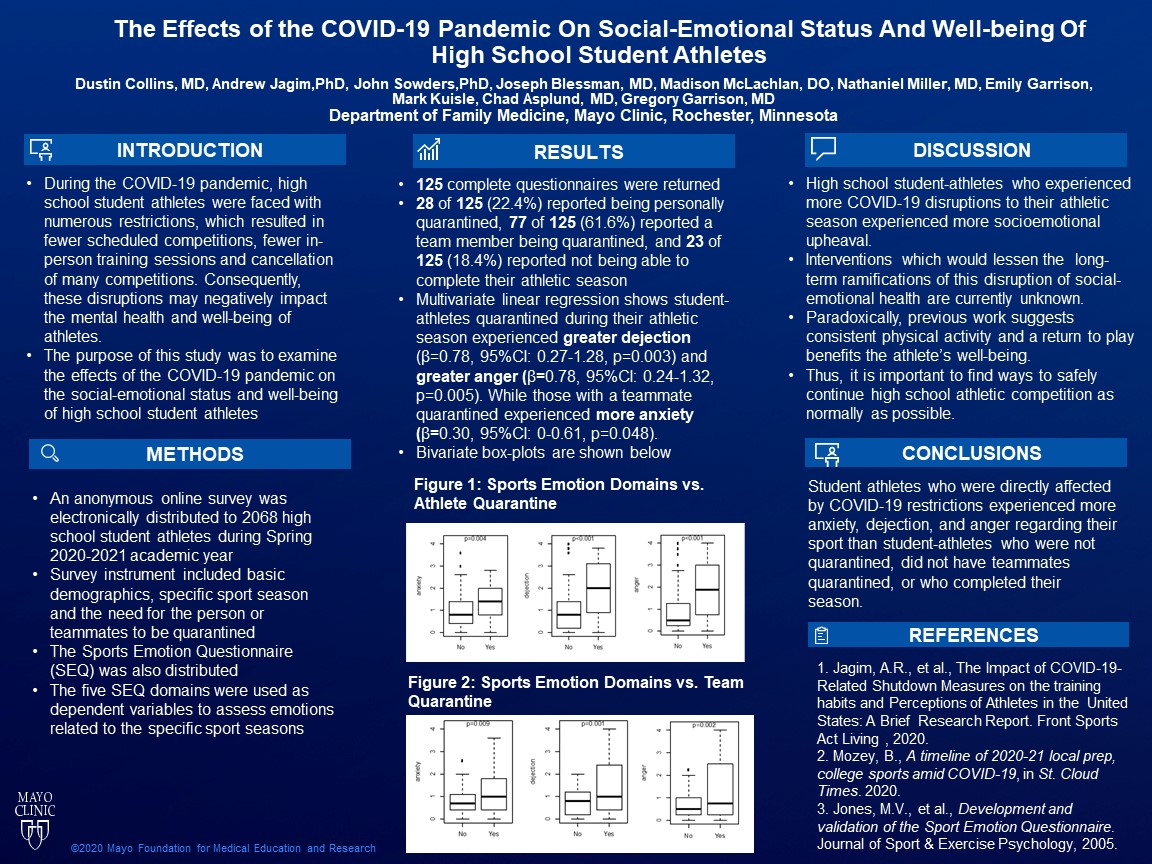PRP029: Emotional impact of COVID-19 modifications on High School Athletes
Dustin Collins, MD; Gregory Garrison, MD, MSc; Nathaniel Miller, MD; Andrew Jagim, PhD; Joseph Blessman, MD; Madison McLachlan, DO
Abstract
Context:
The COVID-19 pandemic has disrupted athletics globally at all levels of sport from Olympic athletes down to recreational players. This has caused complete cancellation of some seasons, shortened schedules, disrupted typical playoffs, and modified competitions and practices. We aim to quantify the social/emotional upheaval that has been experienced by high school athletes secondary to athletic schedule disruption due to COVID-19 via the Sport Emotion Questionnaire.
Objective:
Does increasing disruption caused by COVID-19 modifications in a high school athlete’s sport cause greater social/emotional upheaval as measured by the sport emotion questionnaire.
Study Design:
High school athletes will receive an online survey via Qualtrics. Demographic data including age, grade level, high school name, and level of competition (e.g. Varsity) will be collected as well as how emotions pertain to each respective sport. The previously validated Sports Emotion Questionnaire (SEQ) will be used to measure anxiety, dejection, excitement, anger, and happiness associated with respect to each athlete’s seasonal sport or sports. The SEQ is a validated tool to measure athletes’ emotions associated in the sport setting, but it is not a screening tool for clinical mood disorders. All high school student-athletes within the catchment area of Mayo Clinic Health System are eligible. The total eligible population of student-athletes is estimated to be 15,000. Each athlete may participate in 1-3 seasons. Participating high schools will gather the e-mails of all parents/guardians of student-athletes. School district staff will send out a brief email to the parent/guardians of student-athletes informing them of the survey and inviting them to click a link for more information and consent. Two reminder emails will be sent by district staff at 2 week intervals.
Analysis:
Data collection is ongoing and completion along with analysis are anticipated by August 1, 2021 and therefore will be readily available well in advance of the NACPCRG meeting.
The COVID-19 pandemic has disrupted athletics globally at all levels of sport from Olympic athletes down to recreational players. This has caused complete cancellation of some seasons, shortened schedules, disrupted typical playoffs, and modified competitions and practices. We aim to quantify the social/emotional upheaval that has been experienced by high school athletes secondary to athletic schedule disruption due to COVID-19 via the Sport Emotion Questionnaire.
Objective:
Does increasing disruption caused by COVID-19 modifications in a high school athlete’s sport cause greater social/emotional upheaval as measured by the sport emotion questionnaire.
Study Design:
High school athletes will receive an online survey via Qualtrics. Demographic data including age, grade level, high school name, and level of competition (e.g. Varsity) will be collected as well as how emotions pertain to each respective sport. The previously validated Sports Emotion Questionnaire (SEQ) will be used to measure anxiety, dejection, excitement, anger, and happiness associated with respect to each athlete’s seasonal sport or sports. The SEQ is a validated tool to measure athletes’ emotions associated in the sport setting, but it is not a screening tool for clinical mood disorders. All high school student-athletes within the catchment area of Mayo Clinic Health System are eligible. The total eligible population of student-athletes is estimated to be 15,000. Each athlete may participate in 1-3 seasons. Participating high schools will gather the e-mails of all parents/guardians of student-athletes. School district staff will send out a brief email to the parent/guardians of student-athletes informing them of the survey and inviting them to click a link for more information and consent. Two reminder emails will be sent by district staff at 2 week intervals.
Analysis:
Data collection is ongoing and completion along with analysis are anticipated by August 1, 2021 and therefore will be readily available well in advance of the NACPCRG meeting.

Jack Westfall
jwestfall@aafp.org 11/21/2021Great project. This is a great topic and research study. Nice work. Thanks